- Home
- Cornelia Funke
The Thief Lord Page 3
The Thief Lord Read online
Page 3
“Riccio?” Hornet asked when they were all lying around her, waiting for their story. “Where did you get the candles?”
Riccio self-consciously hid his face between his soft toys. “From the Salute Church,” he mumbled. “There are hundreds, probably thousands lying around there. So it doesn’t really matter if I take a few every now and then. Why should we spend our precious money on candles? I swear,” he grinned at Hornet, “I always blow the Virgin Mary a kiss for each one.”
Hornet buried her face in her hands and sighed.
“Oh, go on, start reading!” Mosca said impatiently. “No Carabiniere will ever arrest Riccio for stealing a few candles, would he?”
“They could!” mumbled Bo. He yawned and curled up next to Prosper, who was struggling with a needle and thread over the holes in his brother’s pants. “Because Riccio’s guardian angel won’t look after him if he steals things from a church. He’s not allowed to.”
“Pah, trash! Guardian angel!” Riccio made a contemptuous face, although he did sound a little worried.
Hornet read for nearly an hour, while the night outside grew darker and all those who had filled the city with noise during the day were long in their beds. Finally the book slipped from her fingers, and her eyelids drooped. When Scipio finally arrived, they were all fast asleep.
4
Prosper wasn’t sure what had woken him — Riccio mumbling in his sleep or Scipio’s quiet steps. As he started from his sleep, a slender figure emerged from the dark. Under the black mask that hid Scipio’s eyes, Prosper could make out his pale chin. The mask’s long crooked nose gave him an eerie birdlike appearance. Similar masks had once been worn by the doctors of Venice, at the time when the Black Death had raged through the city more than three hundred years ago: the Birds of Death, people called them. Smiling, the Thief Lord pulled the creepy thing from his face.
“Hi, Prop!” Scipio let the light of his flashlight wander over the others’ sleeping faces. “Sorry it got so late.”
Prosper pushed Bo’s arm carefully from his chest and sat up. “One day you’re going to scare someone to death with that mask,” he said quietly. “How did you sneak in here? We bolted everything really well this time.”
Scipio shrugged. He ran his slender fingers through his long raven black hair, which he usually wore in a ponytail. “You should know by now that I can get into any place I want to.”
Scipio, the Thief Lord.
He liked to act grown-up, although he was not much older than Prosper, and a good bit smaller than Mosca — even in his high-heeled boots. These were much too big for him, but he always kept them well polished — they were black leather, as black as the strange long coat that reached down to his knees. He never went anywhere without them.
“Wake the others,” Scipio commanded in his bossy, condescending voice, which Hornet hated so much. Prosper ignored him.
“Well you’ve woken me already!” Mosca grumbled behind them, yawning. He pushed himself up from among his fishing rods. “Don’t you ever sleep, Thief Lord?”
Scipio didn’t answer. He strutted like a peacock through the auditorium while Hornet and Mosca nudged the others awake.
“I see you’ve done some clearing up!” Scipio called out. “Excellent. The place looked like a pigsty last time.”
“Hi, Scip!” Bo scrambled so quickly out of his sleeping bag that he nearly fell over his own hands. Barefoot, he ran toward Scipio. Bo was the only one who could call the Thief Lord Scip without getting an icy stare in response. “What did you steal this time?” he asked excitedly, jumping around Scipio like a puppy. Smiling, the Thief Lord slipped a black sack from his shoulder.
“Did we check out everything properly this time?” Riccio asked humbly, crawling out from underneath his stuffed animals. “Come on, tell us.”
“He’ll start kissing his boots soon!” Hornet grumbled so quietly that only Prosper heard it. “I for one would be happy enough if the fine gentleman didn’t turn up so often in the middle of the night.” She frowned at Scipio while she squeezed her spindly legs into her boots.
“I had to change my plans at short notice!” Scipio announced, as they all assembled around him. He threw a folded newspaper toward Riccio. “Read. Page four. At the top.”
Eagerly, Riccio kneeled down on the floor and started leafing through the large pages. Mosca and Prosper leaned over his shoulders. Hornet stood a little way away and played with her braid.
“Spectacular break-in at the Palazzo Contarini,” Riccio read haltingly. “Valuable jewelry and various works of art stolen. No trace of the perpetrators!” He raised his head in surprise. “Contarini? But we watched the Palazzo Pisani.”
Scipio shrugged. “So, I changed my mind. The Palazzo Pisani comes later. It won’t run away, will it? And the Palazzo Contarini” — he dangled the sack in front of Riccio’s face — “had a few worthwhile things in it too.”
He enjoyed the attentive faces around him for a moment and then sat down cross-legged in front of the starry curtain. He poured the contents of his sack on the floor in front of him. “I’ve already sold the jewels,” he explained as the others stepped forward reverently. “I had to pay off a few debts and I also needed new tools, but here, these are for you.”
On the floor, sparkling in the dim light, lay a couple of silver spoons, a medallion, a magnifying glass with a silver snake coiled around its handle, and a pair of golden tongs, set with tiny precious stones with a handle shaped like a rose.
Bo, wide-eyed, leaned over Scipio’s haul. Carefully, as if the treasures could crumble in his small hands, he picked up one piece after another, felt it, and put it back. “Is it all real?” he asked, looking at Scipio.
Scipio just nodded. Pleased with himself and the world, he stretched his arms and lay down on his side. “So what do you say? Am I the Thief Lord, or not?”
Riccio just nodded dumbfoundedly and even Hornet couldn’t hide the fact that she was quite impressed.
“Boy, one day they are going to catch you,” Mosca murmured, staring fascinated at the serpentine magnifying glass.
“No way!” Scipio rolled onto his back and looked up at the ceiling. “Although I have to say it was quite a close call this time. The alarm system was not as old-fashioned as I expected and the lady of the house woke up just as I snatched the medallion from her bedside table. But I was on the roof of the house next door faster than she could climb out of her bed.” He winked at Bo who was leaning against his knee, looking at him awestruck.
“What are these for?” Hornet asked, holding up the rose tongs. “For pulling hair out of your nostrils?”
“Hell, no!” Scipio pushed himself up and snatched the tongs from her fingers. “Those are sugar tongs.”
“How do you know all this stuff?” Riccio gave Scipio a look between admiration and envy. “You grew up in an orphanage just like me, but the nuns never told me anything about sugar tongs or stuff like that.”
“Well, it’s been a while since I ran away from the orphanage,” Scipio answered, brushing the dust from his black coat. “And, furthermore, I don’t bury my nose in comics all day …”
Riccio stared at the floor in embarrassment.
“Well, I don’t only read comics,” said Hornet, putting her arm around Riccio’s shoulder, “and I’ve never heard of sugar tongs. And even if I had, I wouldn’t be stupid enough to get all stuck-up about it!”
Scipio cleared his throat, avoiding Hornet’s look. Finally he said more gently, “I didn’t mean it, Riccio. You can get through life perfectly well without knowing what sugar tongs are. But I can tell you, this little thing is worth quite a bit, so this time you’d better get a decent price from Barbarossa. Understood?”
“Can you also tell us how, then?” Mosca exchanged helpless glances with the others. “We really tried last time but he’s just too smart for us.”
They all looked at Scipio remorsefully. Ever since he had become their provider and their leader, it had been their job
to turn the loot into money while he took care of the stealing. Scipio had told them who to go to, but he left the haggling to them. The only person in town who would do business with a gang of kids was Ernesto Barbarossa. A fat man with a red beard, Barbarossa had an antiques shop where he sold cheap trash to the tourists, but he also did secret deals with more valuable, and usually stolen, items.
“We’re not all cut out for this!” Mosca continued. “Negotiations and haggling, and so on. The redbeard just takes advantage of us.”
Scipio frowned while he fiddled with the cord of his sack.
“Prop can haggle like no one else,” Bo suddenly said. “When we used to sell things at the flea market, he always put on this stony face and …”
“Shut up, Bo!” Prosper interrupted his little brother. His ears had turned bright red. “Selling old toys is a little different from all this …” He nervously took the medallion out of Bo’s hand.
“What’s so different?” Scipio scrutinized Prosper’s face as if he could read there whether Bo had been right or not.
“Well, I’d be glad if you dealt with it for us, Prop,” Mosca said.
“Yes.” Hornet shuddered. “The redbeard gives me the creeps every time he looks at me with his little piggy eyes. I always think he’s secretly laughing at us or that he’s going to call the police or something. I can’t wait to get out of his shop.”
Prosper scratched himself behind the ear, still looking embarrassed. “If you think so,” he said. “I can probably haggle pretty well. But Barbarossa is crafty. I was there last time when Mosca sold him the other stuff.”
“Try it.” Scipio jumped up and hung the empty sack over his shoulder. “I’ve got to go. I have another appointment to keep tonight, but I’ll be back tomorrow.” He pulled the mask over his eyes. “Sometime in the late afternoon. I want to hear what the redbeard paid you for these things here. If he offers you …” he cast a thoughtful look over his loot “… well, if he offers you less than two hundred thousand lire, then just bring the stuff back for the time being.”
“Two hundred thousand!” Riccio’s mouth stayed open.
“These things are definitely worth much more,” Prosper insisted.
Scipio turned around and just said, “Probably.” He looked quite scary again, with the long black bird nose. The naked lights cast his shadow massively on the movie theater’s walls. “See you!” he said. He turned once more before vanishing through the musty curtain. “Do we need a new code word?”
“No!” The answer came very quickly and in perfect harmony.
“Fine. Oh yes, Bo,” — Scipio turned around again — “there’s a cardboard box behind the curtain. There are two little kittens in there. Someone wanted to drown them in the canal. Look after them, will you? Good night, everybody.”
5
The shop where so much of the Thief Lord’s loot had been turned into money lay in a small alley not far from the Basilica San Marco. Next door to it was a pasticceria with pastries and cakes of all shapes and sizes in its windows.
“Come on,” Prosper grumbled at Riccio, who was pressing his nose against the shop window. Reluctantly, Riccio let himself be dragged away, his head still swimming with the scent of sweet almonds.
Barbarossa’s shop didn’t exactly smell as nice. From the outside it didn’t look any different from all the other junk shops in Venice. The glass front was painted with ornate letters: ERNESTO BARBAROSSA — RECORDI DI VENEZIA, Souvenirs of Venice. In the window itself, there were vases and candlesticks, surrounded by little gondolas and glass insects, laid out on threadbare velvet drapes. Thin china plates were crammed next to piles of old books, and pictures in tarnished silver frames lay next to cheap paper masks. Barbarossa stocked whatever anyone could desire. And if something particular wasn’t on show, then the redbeard would get hold of it — by crooked means if necessary.
Dozens of glass bells chimed above his head as Prosper opened the shop door. Inside, a few tourists stood among the crammed shelves, whispering as solemnly as if they were in a church. They seemed awed, either by the chandeliers that hung from the dark ceiling, or by the countless candles that burned everywhere in their heavy holders.
With bowed heads, Prosper and Riccio pushed past the tourists. A man was holding a statuette that Mosca had sold to the redbeard two weeks before. When Prosper saw the price tag underneath its plinth, he nearly knocked over a large statue in the center of the shop.
“Do you remember how much Barbarossa paid us for that figure there?” he whispered to Riccio.
“No. You know I can’t remember numbers.”
“Well, that number has now got two more zeros on the end of it,” Prosper whispered. “Not a bad deal for the redbeard, is it?”
He stepped up to the counter and rang the bell next to the register. Riccio made faces at the masked lady smiling down at them from a large painting on the wall. This was his regular joke, for behind the lady’s mask was a peephole through which Barbarossa kept an eye on his customers.
A few seconds later the beaded curtain behind the counter tinkled into life and Ernesto Barbarossa appeared in person. The redbeard was a very fat man but Prosper was always amazed at how nimbly he could move through his crammed shop.
“I hope you brought some decent goods this time,” the man murmured disdainfully, but the boys noticed how he stared at the bag in Prosper’s hands, like a hungry cat eyeing up a fat, juicy mouse.
“I think you’ll be interested,” Prosper answered. Riccio said nothing. He was staring at Barbarossa’s ginger beard as if he expected something to crawl out of it at any moment.
“What are you looking at, you little ferret?” the redbeard cursed.
“Oh, I, I —” Riccio began to stutter “— I was just wondering whether it was real. The color, I mean.”
“Of course it’s real! Are you saying I dye my beard?” Barbarossa growled at him. “You gnomes get some strange ideas.” He stroked his beard with his fat, ringed fingers. Then he nodded discreetly in the direction of the couple of tourists that were still standing by the shelves, whispering to each other. “I’ll get rid of them as quickly as possible,” he muttered. “Go ahead into my office — and don’t even think of touching anything! Clear?”
Prosper and Riccio nodded. Then they disappeared behind the beaded curtain.
Barbarossa’s office looked completely different from his shop. Here there were no chandeliers, no candles, or glass insects. The windowless room was lit by a neon light and was completely bare, except for a big desk with a massive leather armchair behind it, two guest chairs, and a few high shelves stuffed with meticulously labeled boxes. A poster from the Museo di Accademia hung on the white wall behind the desk.
There was also an upholstered bench, placed underneath Barbarossa’s peephole. Riccio climbed onto it and peered into the shop. “You’ve got to see this, Prop,” he whispered. “The redbeard is purring around those tourists like a fat tomcat. I don’t think anyone has ever escaped his shop without buying something.”
“Or without paying far too much for it.” Prosper placed the bag with Scipio’s loot on one of the chairs and looked around.
“He definitely dyes it,” Riccio murmured without taking his eye from the peephole. “I’ve bet Hornet three comics that he does.”
Barbarossa’s head was as bald as a glitter ball. His beard, however, grew thick and frizzy and was the color of fox fur. “I think there’s a bathroom behind that door,” whispered Riccio. “Have a look and see if he’s got any hair dye in there!”
“If I have to.” Prosper crossed to the narrow passage and put his head around another door. “Wow! There’s more marble here than in the Doge’s Palace,” Riccio heard him say. “This is just about the classiest bathroom I’ve ever seen.”
Riccio pressed his eye against the peep hole. “Prosper, get out of there,” he called under his breath. “The redbeard is finished with the customers — and he’s locking the door!”
“He dyes it, Ri
ccio!” Prosper called. “The bottle’s right here, next to his smelly aftershave. Eurghh, that stinks! Should I dye a bit of toilet paper as evidence?”
“No! Get out of there!” Riccio jumped off the bench. “Quick, he’s coming back, darn it!”
The beaded curtain announced Barbarossa as he entered the office.
Prosper and Riccio were sitting in front of his desk, wearing their most innocent faces.
“I’m going to have to deduct the money for a glass beetle,” the burly redbeard announced as he let himself fall into his vast armchair. “Your little brother,” he gave Prosper a disapproving look, “broke it last time.”
“He did not,” Prosper protested.
“Oh yes he did,” Barbarossa replied without looking at him. He took a pair of glasses from his drawer. “So, what have you got for me today? I hope it’s not just fake gold and inferior silver spoons.”
With a stony face, Prosper emptied his bag onto the desk. Barbarossa leaned forward. He took the sugar tongs, the medallions, and the magnifying glass, one by one, and turned them in his pudgy fingers. He inspected them from every angle, the boys watching him closely. His face showed nothing. He picked each item up, put it back down, and picked it up again, then pushed it aside, looked at it again — until the boys were scraping their feet impatiently on the floor.

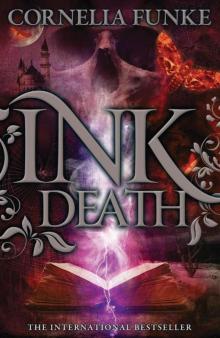 Inkdeath
Inkdeath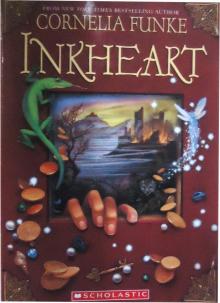 Inkheart
Inkheart Ghost Knight
Ghost Knight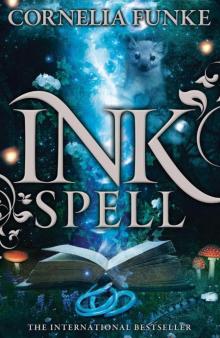 Inkspell
Inkspell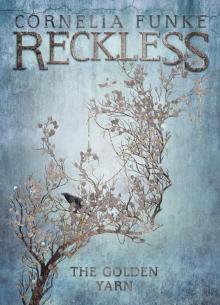 The Golden Yarn
The Golden Yarn Fearless
Fearless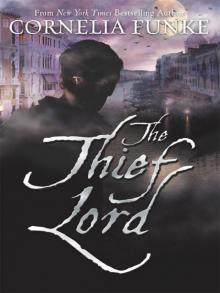 The Thief Lord
The Thief Lord The Griffin's Feather
The Griffin's Feather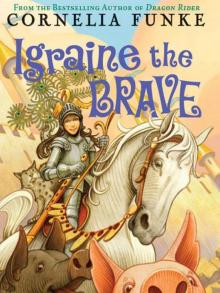 Igraine the Brave
Igraine the Brave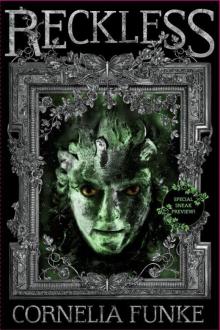 Reckless
Reckless When Santa Fell to Earth
When Santa Fell to Earth Dragon Rider
Dragon Rider Living Shadows
Living Shadows Lilly and Fin: A Mermaid's Tale
Lilly and Fin: A Mermaid's Tale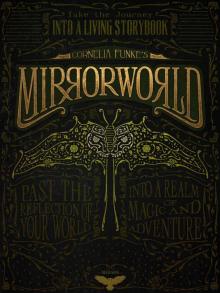 The MirrorWorld Anthology
The MirrorWorld Anthology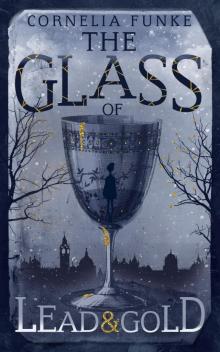 The Glass of Lead and Gold
The Glass of Lead and Gold Ghosthunters and the Incredibly Revolting Ghost
Ghosthunters and the Incredibly Revolting Ghost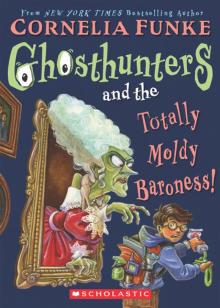 Ghosthunters and the Totally Moldy Baroness!
Ghosthunters and the Totally Moldy Baroness! Reckless II
Reckless II Griffin's Feather
Griffin's Feather Emma and the Blue Genie
Emma and the Blue Genie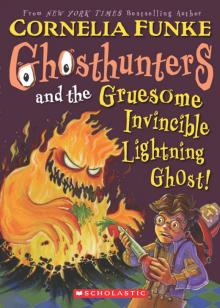 Ghosthunters and the Gruesome Invincible Lightning Ghost
Ghosthunters and the Gruesome Invincible Lightning Ghost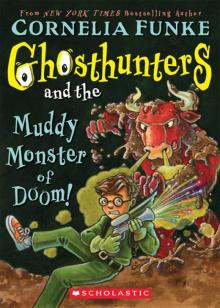 Ghosthunters and the Muddy Monster of Doom!
Ghosthunters and the Muddy Monster of Doom! Inkheart ti-1
Inkheart ti-1 The Pirate Pig
The Pirate Pig Inkspell ti-2
Inkspell ti-2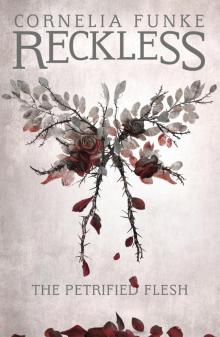 The Petrified Flesh
The Petrified Flesh Inkdeath ti-3
Inkdeath ti-3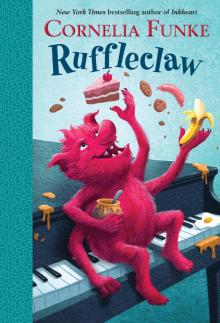 Ruffleclaw
Ruffleclaw Lilly and Fin
Lilly and Fin